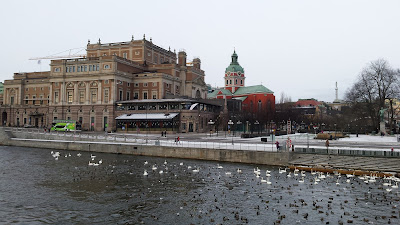Stockholm, Sweden: Simply Beautiful With or Without Snow - Day 1
Being the cultural,
economic and political center of Sweden, Stockholm has become the most populous
metropolis in the Nordic Region. It has been inhabited since the Stone Age,
when people lived on the several islands comprising the Stockholm archipelago,
situated south of Lake Malaren.
Personally, Stockholm
has been one of the cities I would like to visit due to its proximity and
resemblance with the Norwegian capital Oslo. I was particularly interested in
making an indirect comparison on the two cities’ similarities and differences.
The only way to do this, I thought was to explore the city by foot.
Unfortunately, during my two-day visit, it was too cold at negative 8 degrees
Celsius, such that I needed to cut my first day short.
Click here for the second day of the Stockholm visit.
Click here for the second day of the Stockholm visit.
1. Stockholm City Conference Centre
Adjacent to the City
Centrum, this conference center provides venue for important events.
2. Norra Bantorget
This is an area for
the Social Democratic party of Sweden. This is where demonstrations has been
held to fight for the rights of the workers and improve the working conditions
of the working social class of the city.
3. Stockholms Centralstation
The busiest station in Sweden with over 200,000 visitors daily. Interestingly, the generated heat by the thousands of visitors is used to warm a nearby office building.
The busiest station in Sweden with over 200,000 visitors daily. Interestingly, the generated heat by the thousands of visitors is used to warm a nearby office building.
In front of the
station is the statue of Nics Ericsson, who was a prominent Swedish canal and
railway builder.
4. Järnvägsparken
It is a paved park
near the city’s central station. This park was filled with trees before until
traffic increased to and from the city. A mosaic tiles now covered the park.
5. Klara mälarstrand
This is perhaps the must-see view of the Swedish capital every tourist should experience.
It is a quay and park
area next to central Stockholm. The area stretches from Stadshusbron in the
West during the Central Bridge.
6. Stockholms stadhus
It is one of Sweden's
most famous buildings and the city's most exclusive party venue. It is a house known for its
hospitality, its unique art treasures, magnificent celebrations and its
interesting history.
7. Norra Järnvägsbron
The Central bridge is
a major traffic route connecting Gamla Stan to the southern districts. This is
the second bridge constructed in the sixties after the southern bridge was
constructed after World War 2.
8. Gamla Stan
This has been first
occupied by the Vikings since the Ice Age. The Vikings used the Stockholm’s Old
Town as trading center in the ancient times, especially with the Baltic
countries of the Hanseatic League.
9. Mynttorget
This is the square in
the Old Town. It is between the castle and the Riksdagshuset, where
demonstrations and protests are commonly held.
10. Norrbro
This is an arch
bridge, which extends from the northern front of the Royal Palace passing over
Helgeandsholmen. It was completed in ten years, with the northern portion,
supported by three arches, and the southern, supported by a single arch.
11. Helgeandsholmen and Riksplan
Interestingly, the
second part of the word Stockholm, Holm means islet, which referred to
Helgeandsholmen, where the Old Town was built and protected from invasion of
foreign navies by fornification, which are primarily built of wood. This has
been the origin of the word, Stock, which means log in Swedish, comprising the etymology
of the name of the Swedish capital.
12. Strömparterren
It is the peninsula situated in Norrström, was named after the garden-like park.
It is the peninsula situated in Norrström, was named after the garden-like park.
At the tip of the
semi-circular cape Carl Milles sculpture Sun Singer, which portrays a famous
poem about song to the sun.
13. Gustav Adolfs Torg
This is a public
square in honor of King Gustav 2 Adolf, who was credited as the founder of
Sweden as a Great Power. He made Sweden a supreme military power, a deciding
factor in the political and religious balance in Europe.
14. Riksbron and Riksgatan
This is an old street
in the Old Town, which is the location of the Bank of Sweden until nowadays. Before this the street was regarded as part of
Drottninggatan or the Queen’s street. It is said to be the only street not own
by the city, but by the Parliament.
The
first day in Stockholm was quite not what I wanted it. I was able to see a
glimpse of the city and but was not able to see churches and establishments,
which could give me a great overview of the culture, people and history of the
Swedish capital.
Because of this, I decided to make changes on the second day, even though the cold weather and snow could prevent me from making an optimal vacation in the Swedish metropolis.
































Comments
Post a Comment